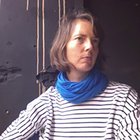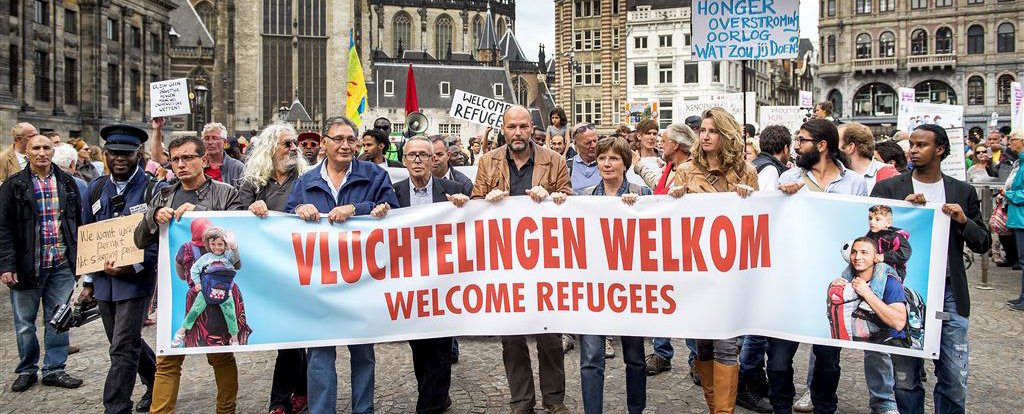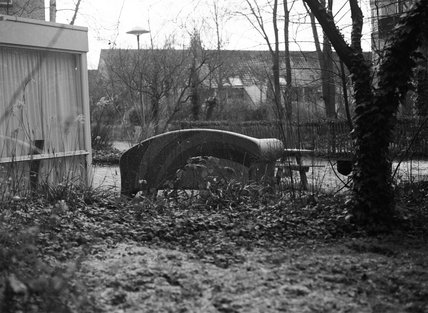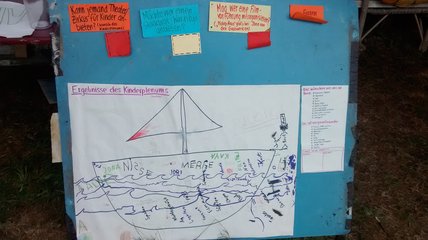These questions rage at the center of the current political crisis of refugees entering Europe from North Africa and the Middle East. Indeed, as some have argued, the problem or “crisis” is not so much that thousands of people are fleeing their homes in search of safety, but that European states (and some of their citizens) are ill equipped (or reluctant) to accept them.
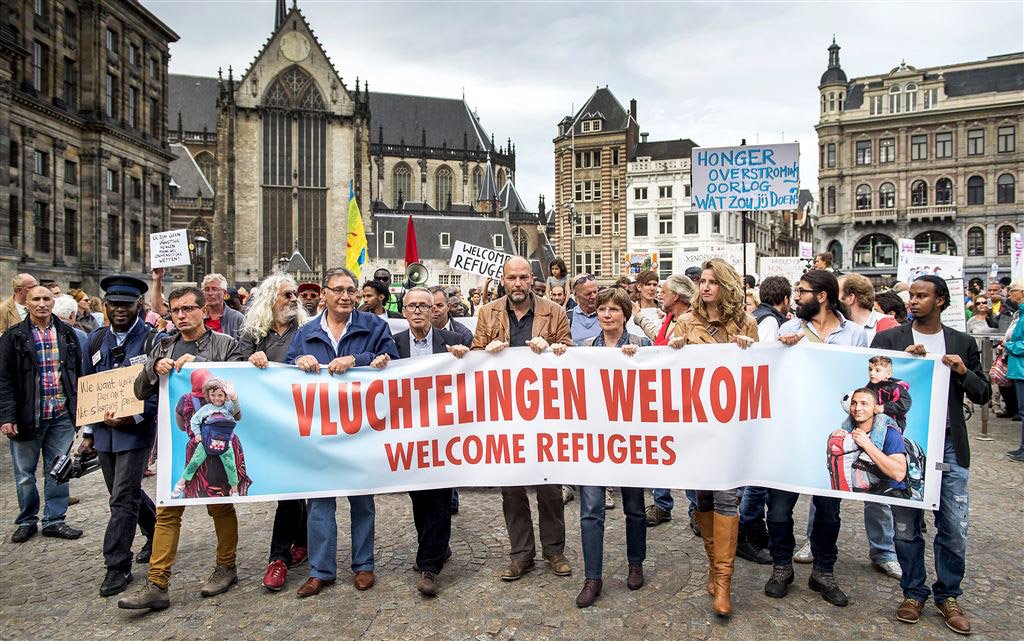
'Welcome refugees' (Amsterdam, 2015)
Europe’s Current Refugee Crisis in Context
It is important to catalogue the most recent wave of refugees coming to Europe with the history of other major influxes of refugees due to internal conflicts (such as WWII) or external conflicts (such as decolonization). As Lyndsey Stonebridge reminds us, as we consider this history of displacement
we need to remember it is not a proud tradition of hospitality and compassion, which in any case is largely mythical. The twentieth century witnessed a refugee calamity the likes of which had never been seen before. From fleeing Armenians and Russians, Greeks, Turks, and Jews fleeing pogroms in the early part of the century to the catastrophe of the death camps, many suddenly discovered they were strangers in their own lands.
The ongoing movement of refugees from Syria to Europe is the result of internal conflicts in Syria, but this should also be linked to the history of French and Ottoman colonial conquest, as well as to recent American (and EU) military involvement in the region. Moreover, Syrian refugees are joining the many other national groups with postcolonial (and neocolonial) status coming from Iraq, Afghanistan, Eritrea, and Iran. While Europe may feel that it is drowning in refugees, the vast majority of those fleeing the war in Syria have gone to Turkey, Iraq, Lebanon, and Jordan. According to the United Nations High Commissioner for Refugees (UNHCR), over 3 million people have fled to Syria's immediate neighbours, 6.5 million are internally displaced within Syria, and so far 150,000 have sought asylum in Europe. Most of the refugees who arrived in Europe are now being resettled in Germany.
(Un)usual Business note: The term “postcolonial” here refers to countries that have been colonized and governed by mainly Western states in the past. Some of these countries are now “neocolonial”, meaning that these former colonies are still exploited by rich, often Western countries, albeit in different ways.
According to the Dutch office that coordinates shelter for asylum seekers, the Centraal Orgaan opvang asielzoekers (COA), the Netherlands resettles thousands of asylum seekers every year. In 2014, for example, the Netherlands granted 12,550 people refugee status, and these numbers will certainly increase given the precipitous rise in asylum seekers. Indeed, due to the current crisis, government officials recently agreed to build temporary housing for an additional 14,000 refugees and permanent housing for 10,000 refugees. This decision was quite contentious and the debate about how many refugees to accept is ongoing. Local municipalities will be fined if they do not comply with the request for housing. Clearly, some local governments are more willing to accept this burden than others, and so the process of resettlement varies across the country.
In Utrecht, city officials have been open and welcoming of refugees. One reason may be because the local government has made a commitment to making Utrecht a “Human Rights City.” According to Wim Datema and Esther Feldmann,
This public commitment is at the core of current activities to accommodate refugees in Utrecht. Apart from providing a centre for asylum seekers, the city has set up a number of emergency shelters to welcome refugees. At the same time the city is looking for additional temporary and permanent locations to house asylum seekers.
This commitment has made a big difference, however some residents are hesitant to have large shelters in the city. Some Utrechters using the slogan “AZC, weg ermee” (asylum seeker centre, get rid of it) are creating a negative public discourse. In Utrecht and in other Dutch cities, supporters of Pegida (the German right-wing movement that supports “anti-Islamization”) or Geert Wilders (a Dutch politician who opposes Islam) have rallied and expressed (at times violently) opposition to receiving refugees.
In addition to the histories of displacement and of mass mobilizations of refugees, current events should be contextualized within Europe’s complex economic migration situation. This is important because of the tensions and confusions between the categories of political and economic refugees or migrants. Many more people are inclined to have empathy towards political refugees, whereas economic migrants are more often looked down upon (particularly undocumented migrants). In a recent documentary film, “Dispereert Niet,” some of these negative attitudes are poignantly depicted. The film brings the lives of undocumented Indonesians and other economic migrants from former Dutch colonies out from the shadows.
(Un)usual Business note: These categories originate from the Convention relating to the Status of Refugees, drafted by the United Nations in 1951.
Despite the fact that migratory labor is now a permanent feature of the EU, some politicians and citizens have negative views towards the people who come into (or move within) the EU for work. These negative views of economic migrants are used to question the acceptance of more asylum seekers and, as in recent political debates, to validate the need for increased border controls. This is because it is assumed that the influx of asylum seekers will also carry large numbers of economic migrants who, it is assumed, do not deserve the same sympathy. Thus, some EU countries are putting up border restrictions as well as fences to curb the flow. These are controversial decisions given the fact that open internal borders (via the Schengen agreement) are a fundamental feature of the EU.
Because of the shifting and precarious character of the refugee process, community support is quite important
Welkom in Utrecht
Amidst the controversies and complications, citizens in Utrecht are trying to welcome refugees to the city and to help those displaced find a new home in Dutch society. Many people want to be involved, but there is a lot of coordination that goes along with this interest. This is where the group Welkom in Utrecht
Welkom in Utrecht
‘Welkom in Utrecht’ is an initiative by regular people in Utrecht. At the start of September 2015, a group of people created a Facebook page. Simultaneously, with no relation at all, another group of people launched a website to increase the involvement of the people ...
serves a vital role in Utrecht. The group was developed (at first separately, but now in coordination) as a website and Facebook page.
I spoke with two of the four developers of the Welkom in Utrecht Facebook page on December 1, 2015. Rebecca de Kuijer and Katinka Jesse wanted to be a part of a response to help support the refugees coming to their city. The idea emerged in September 2015 when (with co-organizers Hellen Kooijman and Frank van Soest) they put up the Facebook group “Welkom in Utrecht.” The page provides information about what resources and volunteers are needed by local organizations. Within 24 hours it seemed that the city government had incorporated the group into its strategic planning, relying on its organizers to coordinate community resources. The volunteer organization has grown organically and continues to shift and evolve as both the refugee situation changes and as organizations outside the ‘refugee care’ circle become involved. The page has almost 7,000 followers.
(Un)usual Business note: What does it mean for the autonomy and sustainability of a community economy like Welkom in Utrecht that the local government relies so heavily on their volunteer work? How can we understand the volunteer work of these kinds of citizen initiatives in relation to our crumbling welfare state and a government that is retreating from the public sector?
What does Welkom in Utrecht do? In the spirit of commoning, the organization (via the Facebook page and website) provides a platform through which local people can offer their ideas for help and the government can direct that help to the refugees. There is a lot of grassroots interest, yet many people do not have ties to the longstanding organizations in the city that aid refugees or asylum seekers. So, the ideas and resources at the grassroots level (the commoning of resources and ideas) are connected to the efforts organized by the official government response to refugees, through Welkom in Utrecht.
(Un)usual Business note: Can we self-evidently consider all grassroots activities to be commoning? For example, if refugees have no say over where collected resources end up, they are not part of the community that could maintain those resources as a commons.
Welkom in Utrecht plays an important role in the process of welcoming refugees to Utrecht and, ultimately, in giving them a connection to Dutch society. Certainly, their volunteer hours are valuable to the Utrecht gemeente (government) and the Centraal Orgaan opvang Asielzoekers (COA), the primary government office that coordinates the resettlement process. The process of resettlement for the thousands of refugees arriving in the Netherlands is complex and challenging. Each town or city organizes a response, which is complicated by the shortage of housing in Holland. Refugees in the refugee shelters (noodopvang or asielzoekerscentrum) in Utrecht are typically only there for some time before they are moved to another location as their refugee status is processed.
Because of the shifting and precarious character of the refugee process, community support is quite important. And, while organizations supporting refugees and other vulnerable populations existed in Utrecht before the recent influx, Welkom in Utrecht has brought together groups who had not previously been partners. This networking and community building is an added benefit of Welkom in Utrecht and has arguably broadened the practices of commoning in Utrecht.
For example, in our interview Rebecca reflected on the fact that atheists and religious people bonded at volunteer sessions sorting clothes. This experience helps people feel connected to each other, even when they think differently or have different religious backgrounds. In addition, there are a lot of people who are concerned about the current refugee crisis but have not been part of groups like the Red Cross or Villa Vrede
Villa Vrede
Villa Vrede aims to be an open house, in which undocumented people can feel free to be themselves and develop. Activities are offered by and with volunteers who are undocumented themselves, supported by 2 part-time paid employees (1FTE). In the living room of Villa Vrede ...
(an organization that aids refugees and asylum seekers). Welkom in Utrecht uses a modern interface and, consequently, has brought a new wave of concerned Utrechters into the collective support for refugees.
On the Facebook page you can find announcements for initiatives and calls for volunteers. These announcements for events or requests for volunteers are coordinated (via Welkom in Utrecht) with the local authorities. For example, in the Autumn of 2015 a network of mosques (including the Ulu mosque in Lombok) facilitated a clothes drive and needed volunteers to sort and organize the donations. This network is now called Vluchtelingen Project Utrecht (VPU). The call for volunteers went out on the Facebook page and dozens of people showed up to help. Later, the donations were then transported to the refugees at the temporary shelter. Another example is the organization Eet Mee!, which orchestrates community meals for the refugees. Other initiatives include film screenings, concerts, sharing music, playing football, and art lessons. Recently, in January 2016, the library of Utrecht promoted a language festival at the Kanaleneiland branch in order to reach out to the hundreds of refugees now staying in this quarter of the city.
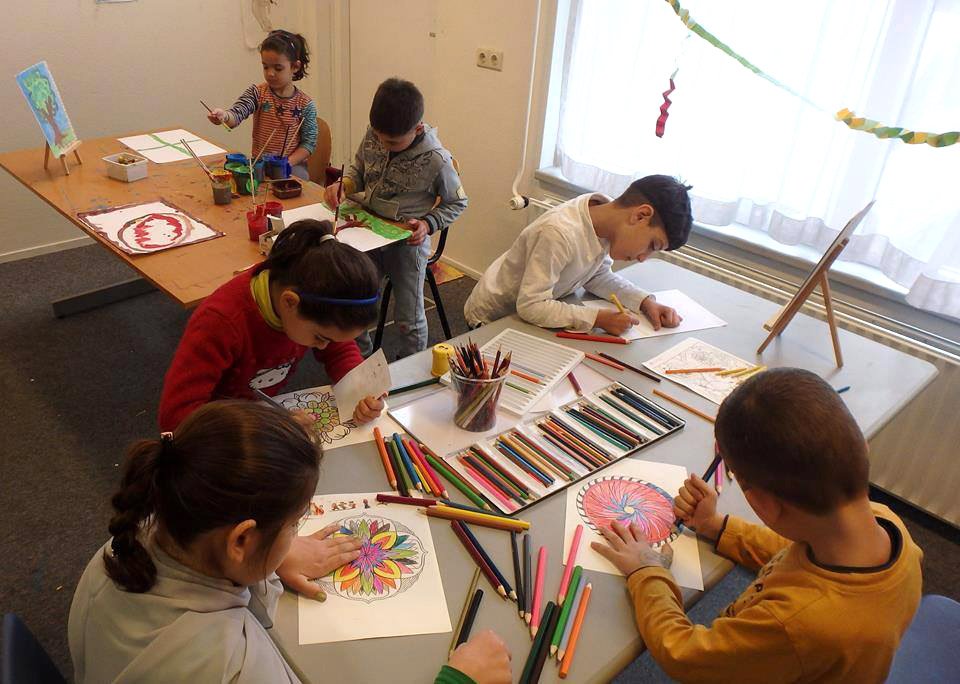
Adding color to the lives of the residents at the emergency shelter in Utrecht together with Hendra Versteegde , Source: Facebook - Welkom in Utrecht
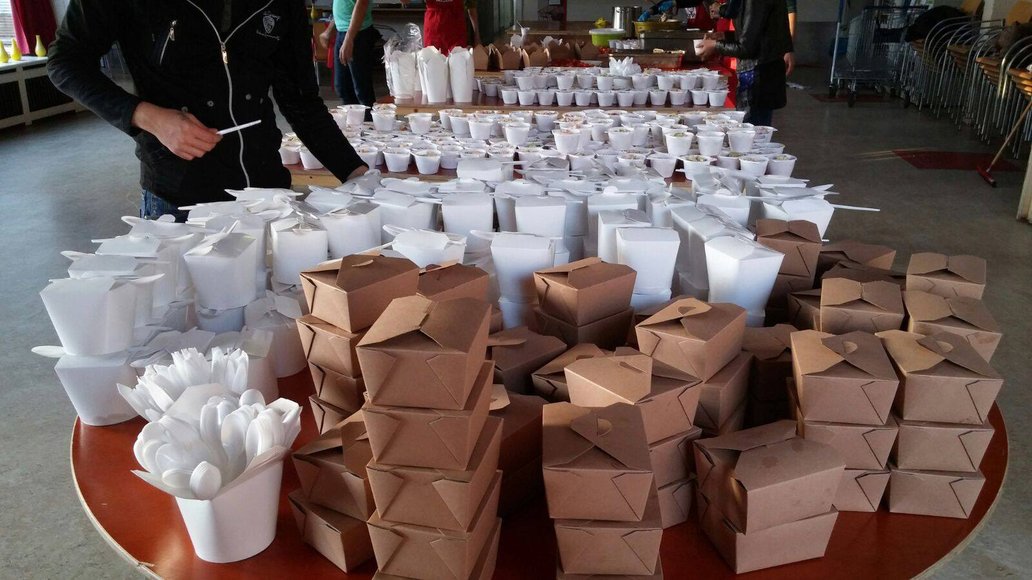
Resto van Harte gave 300 food packages to the refugees in the shelter in Utrecht, Source: Facebook - Welkom in Utrecht
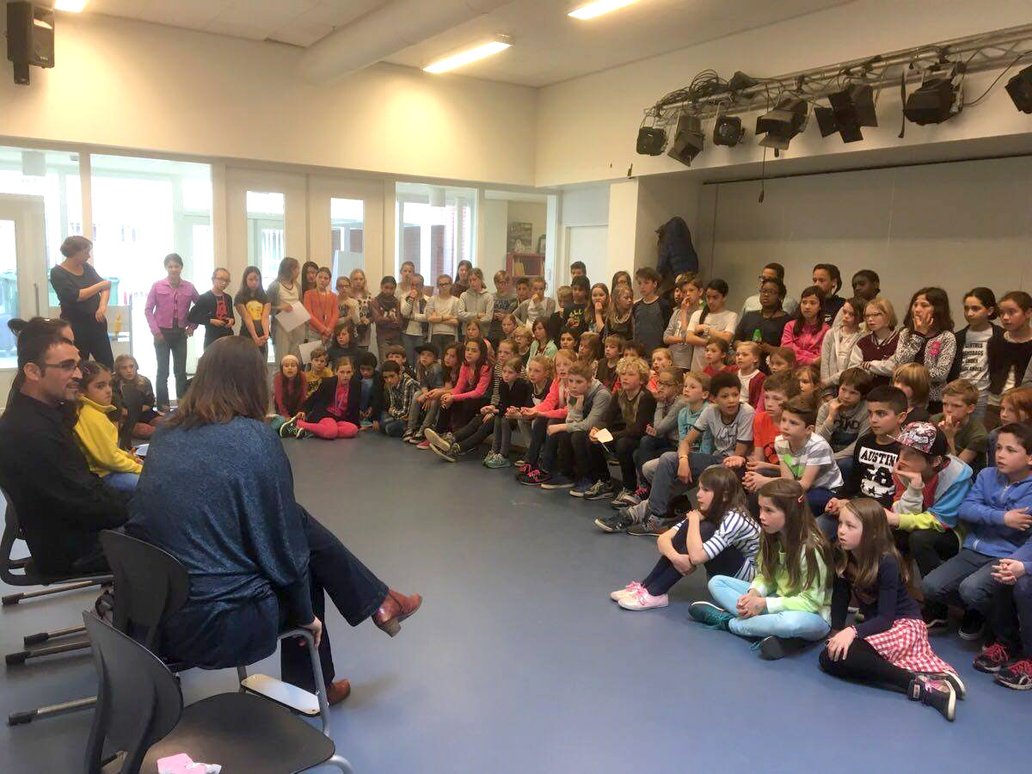
The children at primary school 'De Kleine Dichter' asked all they wanted to know about refugees, their journey to the Netherlands, and their stay here, Source: Facebook - Welkom in Utrecht
All of these initiatives are aimed at providing resources and comfort to the hundreds of refugees temporarily living in Utrecht. The organizers are also committed to the idea that these efforts are important for integrating refugees into Dutch society. Rather than wait months or possibly years for asylum seekers to receive their official paperwork, integration and empowerment can happen from the very beginning. Katinka believes that the Dutch should learn from past mistakes; hence, it is important to offer integration possibilities to newcomers from the very beginning. The process of integration is a two-way street. Dutch citizens must prepare themselves for accepting newcomers, and refugees need to find their way in a new and different culture. This process of mutual understanding (and struggle) is also part of the commoning process. To consider social resources as shared, there must be some recognition of where different people are coming from. Rebecca explains that Welkom in Utrecht facilitates this recognition:
The refugee initiatives can lead to personal contact and mutual understanding. Many refugees who are currently in Utrecht will receive a residence permit. By familiarizing them with our country now, we are investing in the future. (AD 2015)
The first group of 500 refugees left Utrecht on November 4, 2015 (they were taken to Duinrell, Wassenaar) to continue their journey of resettlement. On November 20, 2015, a second group of refugees arrived in Utrecht. The work of Welkom in Utrecht is ongoing, and also shifting and open to change. As time passes, most refugees will become members of Dutch society. Thus, it is present in the minds of many volunteers, as with Rebecca and Katinka, that the process of commoning includes the long-term inclusion of newcomers. How will refugees become part of Dutch society? And what can its current inhabitants do to make it a hospitable place? Importantly, the process of commoning includes not only the sharing of resources – locating clothes, slippers and earplugs, or sharing the love for music and sport – but it also means sharing in the making of what our commons constitutes.
The security of having a place to live is certainly part of the commons
The security of having a place to live – not just in terms of shelter but also in terms of the ability to live in a state that provides basic human rights – is certainly part of the commons. Many believe it is, even as governments battle over the quantity of refugees they are willing to take. But this recent wave of refugees joins others who have been, or are still in, the process of obtaining legal status in the Netherlands. This fact should give current volunteers pause, as the voices of those who remain in legal limbo (and thus, in the shadows of Dutch society) suggest that resettlement is contested and complex.
Organizations such as Wij Zijn Hier (We Are Here) want to expose the difficult lives many refugees and migrants have because the Dutch government has delayed or refused official papers. So, while there may be a rush of empathy towards Syrian refugees because of the civil war in their country, there are many other refugees who slip through the cracks or who are not viewed with the same compassion. Looking more closely at this contradiction will be important for the mutual understanding and cultural integration that the Dutch government hopes to achieve.
A branch of Wij Zijn Hier in Utrecht, for example, recently expressed their hopes for the city to recognize them by producing a cookbook. The Wij Zijn Hier cookbook features photographs and recipes of dishes from the many countries that the refugees represent. Without proper residency status, asylum seekers are not allowed to work. This is financially hard but also keeps people on the sidelines of society. The cookbook (which is still being negotiated for legal purchase) is a tool to validate and give voice to these refugees and, importantly, to raise funds.
What will the future of commoning in Utrecht look like as newcomers become a more permanent feature of the city? Will Welkom in Utrecht broaden its scope to include initiatives that bridge the possible empathy gap between new and old refugees, or between refugees and economic migrants? These are complex but important questions, to which answers remain to be seen. Yet Welkom in Utrecht has embarked on a new mode and phase of commoning in the city of Utrecht.
This article was published in the (Un)usual Business journal Utrecht Meent Het #2 (September, 2016).
